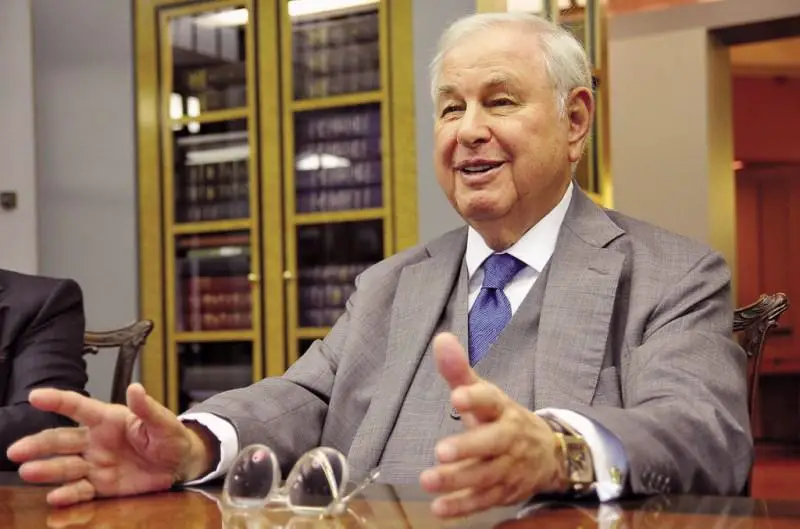
Good morning! This week in the Saturday Extra: how we’re starting to think about the impact of the tragedy in Oxford. Plus, a historical footnote on A. Alfred Taubman and his conviction 20 years ago in the Sotheby’s/Christie’s price-fixing scheme.
I always welcome your notes: abragg@crain.com. Hope it’s a restful weekend.
The big story: Tough week
This week’s tragedy at Oxford High School touched everyone.
On Tuesday, four students were killed and seven other people wounded by a 15-year-old classmate, authorities said. On Friday, the shooter’s parents were charged with four counts of involuntary manslaughter.
First responders, and those who are still at the crime scene that Oxford Community Schools Superintendent Tim Throne described as “like a war zone,” have the job of literally processing the horror. So do health care workers at the hospitals that are still treating the shooting’s victims — during a statewide surge COVID-19 surge that has hospitals ERs and ICUs at capacity. The entire Oxford community is processing their shock, grief and anger.
At least 60 school districts across Southeast Michigan closed this week because of rumored threats of copycat violence, leaving students rattled and parents in the lurch. Ferndale Public Schools were closed Friday not for threats of violence but because too many staff members had to care for their own kids due to school closures elsewhere in the district.
For school administrators and teachers, it all compounded the near-constant disruption they’ve been managing this fall with COVID-19, said Stiles Simmons, superintendent of Westwood Community Schools in Dearborn Heights.
“I think people underestimate the impact that this year will have on students, especially their ability to achieve academically,” Stimmons said.
The horrific story is still unfolding as the investigation continues — you may know more reading this email on Saturday morning than we do while I’m writing it Friday. But the charges against the parents may drive the conversations we have in the wake of this tragedy. It’s rare for parents to be held legally responsible when a child commits a crime with a parent’s gun, but “the facts of this case are so egregious …” Oakland County Prosecutor Karen McDonald said in a press conference Friday, adding that Michigan’s gun laws relating to minors are “woefully inadequate.”
In the Crain’s newsroom, we’re always looking for the business angle. But schools are also workplaces, parents are also workers, health and safety are business issues and, most of all, we’re all human beings, neighbors and fellow citizens. So this week we’re asking more humane questions: How did this happen? What can we do to make sure our schools are safe? How can we care for our kids, our community and each other right now?
It’s been a hard week. I hope you are able to take care of yourself and your loved ones this weekend.
Crain’s Senior Editor Chad Livengood contributed to this piece.
Need to know: Dock deja-vu

A photo from the Michigan Department of Environment, Great Lakes and Energy shows a petroleum-like sheen on the water where a dock collapsed into a boat slip on the Detroit River.
Two years ago, the Revere Dock collapse spilled hazardous materials into the Detroit River and started a debate between environmentalists, businesses and the city of Detroit about how to shore up waterfront storage facilities to protect the river from contamination and prevent future collapses. Two years later (to the day!), it happened again: last Friday, there was another collapse at Revere Dock, reviving the same set of concerns. The city shut down operations at the dock on Thursday after the company ignored a cease and desist order. Will this be the dock collapse that leads to meaningful change? Maybe so: heavy materials storage seems to have played a part in the Southwest Detroit Mystery Bubble, too.
Season of giving: Putting everyone’s $50 Giving Tuesday donations to shame, the Ralph C. Wilson, Jr. Foundation this week announced this week it will invest $100 million over the next 10 years to ensure permanent operating support for arts and culture organizations in Southeast Michigan. Eleven nonprofits will receive a set amount of operating funding from the Wilson Foundation every year — forever! — beginning in 2022. One reason this is a big deal: It’s hard for nonprofits to secure operating funds from philanthropists, who tend to prefer to fund programs and more tangible “impacts” than staff costs, antivirus software, printer paper and the other unsexy essentials.
Back in action: His buying spree had slowed in recent years, but this week Dan Gilbert purchased what might be his most significant downtown building since 2015: Cadillac Tower on Cadillac Square, for an estimated $36 million. Built as the Barlum Tower in 1927, you may know it as the building downtown that doesn’t have windows on its western side; the Cadillac Square Building that had been next door meant that “there was no point in having windows looking into another structure’s windows,” as HistoricDetroit.org reports. (In a previous edition of the Saturday Extra, I wrote about a previous owner of the Cadillac Tower, Henry Keywell, in case you were looking for a deep cut on this building’s history.)
Historical footnote: 20 years ago, Taubman convicted

Crain’s Detroit Business file photo of A. Alfred Taubman.
This week in Detroit business history: Twenty years ago this week, on December 5, 2001, mall magnate A. Alfred Taubman, then chairman of auction house Sotheby’s Inc., was convicted for leading a price-fixing scheme between Sotheby’s and its competitor Christie’s that cost its customers over $100 million.
Taubman’s lawyers never denied that the scheme existed, but argued Taubman knew nothing about it. Their case was undercut by the trial’s star witness, former Sotheby’s CEO Diana Brooks, who testified (in exchange for a lighter sentence) that she set up the fix at Taubman’s direction and with his congratulations. The following spring, Taubman was sentenced to a year and one day in federal prison and fined $7.5 million. (Taubman was also ordered to pay for the cost of his incarceration, an estimated $21,601 annually.) He served 10 months.
Local business leaders told Crain’s Detroit Business at the time that Taubman’s conviction was unlikely to cast a long shadow.
“It’s not like we’re talking about (former Medellin drug cartel leader) Pablo Escobar here,” fundraising consultant Peter Remington told Crain’s reporter Katie Merx (“Execs say conviction won’t hurt reputation Taubman’s built here,” Crain’s Detroit Business, Dec. 10, 2001).
Leaders of educational and cultural institutions including the University of Michigan, the Jewish Federation of Metropolitan Detroit and the Detroit Institute of Arts expressed sympathy and support for Taubman, a prolific philanthropist whose name still graces many buildings in the region.
Years after serving his time, the famously media-shy Taubman talked to Crain’s about his life, work and, oh yeah, that one time he served time in federal prison for a price-fixing scheme. “Taubman called prison ‘warehousing of human beings’ but said he encountered both the good and bad of humanity there. … (he) has quietly provided assistance such as legal review and educational assistance to some inmates he met,” Crain’s reported in 2005.
“I try to be creative,” Taubman said in the same story. “If I put something on my gravestone, it would be: ‘He made a lot of things happen.'”
Taubman died in 2015. Whatever your take on the Sotheby’s scandal, it’s hard to deny that 20 years later, at least in his hometown, it has become a footnote in the larger story of how Taubman transformed how we shop and gave back millions of his self-made wealth to benefit education, medical research and the arts.
As for his gravestone, it actually reads: “Make things better — not just different.”
Most-read stories: Nov. 28-Dec. 4
1. Gilbert adds Cadillac Tower skyscraper to downtown real estate portfolio
2. Foundation makes massive $100 million pledge to metro Detroit arts and culture organizations
3. Restaurant Roundup: New tenant in Gold Cash Gold space, Ann Arbor cafe to close and more
4. Asphalt facility proposed in northwest Detroit
5. Real Estate Insider: The troubled Corktown apartment building without an owner
6. After flood of opposition, Detroit turns down asphalt plant proposal
8. 2021 Best-Managed Nonprofits
9. Developer working on Black-owned business campus in large new Detroit building
